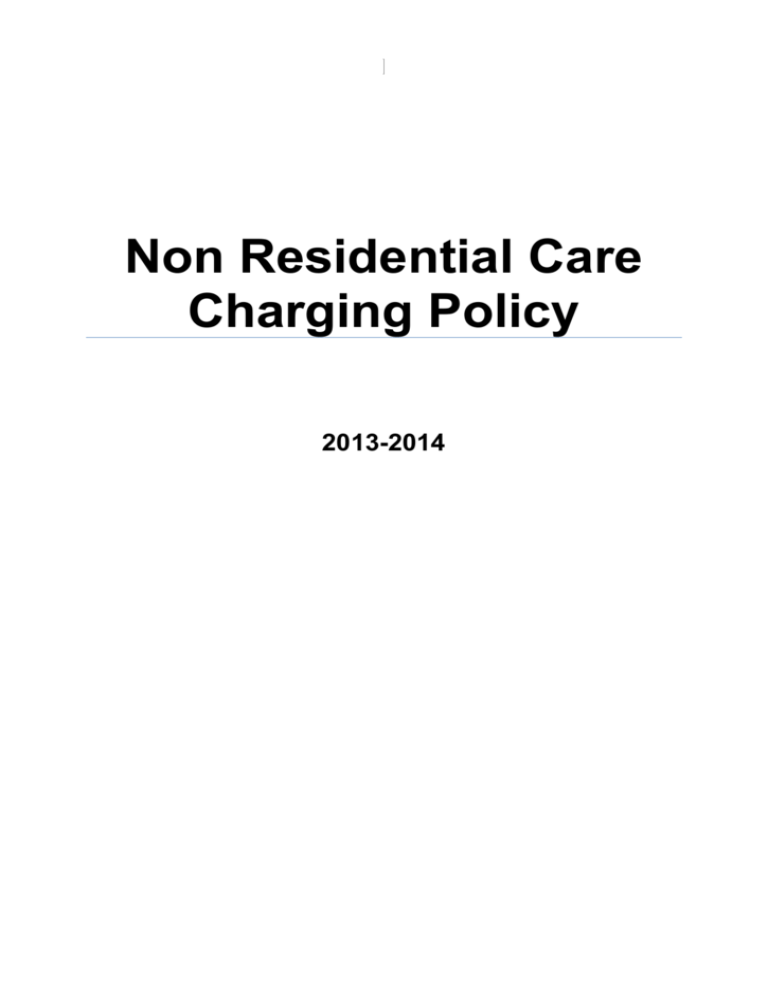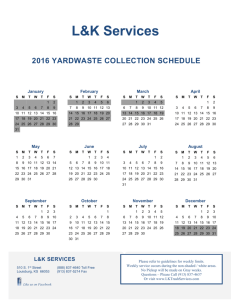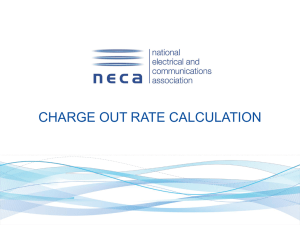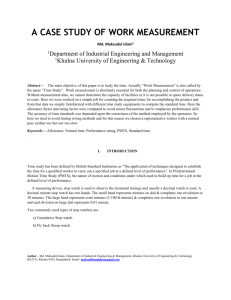Non Residential Care Charging Policy
advertisement

Non Residential Care Charging Policy 2013-2014 RENFREWSHIRE COUNCIL SOCIAL WORK CARE AT HOME CHARGING POLICY Introduction Clients may be charged for certain elements of Renfrewshire Council’s Care at Home Services. These apply whether the service is provided by the in house service or is purchased from an external provider. The charging policy operated by the Council complies with Scottish Government guidance and the COSLA framework. To assess a client’s ability to pay for the services they receive, financial assessments are completed for all clients, other than those highlighted below. Financial assessments take into account the type of service(s) which clients receive as some services are not chargeable. This financial assessment includes a review of income and savings to ensure all benefits due are in payment. If clients have problems relating to debt or are not receiving their maximum benefits they are advised to contact the Advice Works team. If the client agrees, contact will be made on their behalf. Services for which charges do not apply Charges are not made for: Criminal justice social work services, People with mental health problems who are subject to community care or supervision orders or who are subject to a criminal court order (note; if a client under section 18 mental health detention is on leave of absence and benefits are being accessed a financial assessment should be carried out. Where clients are unable to access funds due to issues of capacity the client is still liable to pay a charge which will be recovered, including any backdated amounts, when the client is able to access their funds). Children in need, including: children subject to statutory and voluntary supervision arrangements, and, children in families who are involved with social work under section 12 or 22. Charges are not made for advice or guidance on community care services, for assessment of needs, or for care management. Services which are provided free of charge 1. Home Care services on discharge from hospital In response to the recommendations from the Royal Commission on Long Term Care for the Elderly, the Scottish Government introduced free home care for people aged 65 and over who have been discharged from hospital for a period up to 4 weeks. This applies to clients admitted for treatment, who have had a minimum 24 hour stay and who have been assessed as requiring support upon discharge. Document12 | P a g e Provision of free home care applies to admission to and discharges from hospitals and hospices but does not apply to any stay for respite care. The free 4 weeks applies each time a person is discharged from hospital. Relief from charging should not apply to discharges following admission on a frequent or regular basis as part of ongoing care arrangements, respite and ongoing episodic treatment. 2. Free Personal and Nursing Care The Community Care and Health (Scotland) Act 2002 introduced free nursing and personal care for people in Scotland aged 65 and over. Services which do not fall into the category of “personal care” continue to be chargeable. Information on the services classified as personal care is detailed at Appendix 1. This appendix also includes Renfrewshire Council’s definition of tasks classified as domestic and housing support. Please note: Eligibility for Attendance Allowance or Disability Living Allowance is not affected by Free Personal Care provided in clients own home. Free Personal Care does not depend on income or savings All Nursing Care provided by the NHS in clients own homes is free of charge. Services which are chargeable 3. Housing Support Services Renfrewshire Council’s Care at Home Charging policy relates to all housing support services. Prior to 10 April 2006 clients in receipt of housing benefit did not make a contribution towards the cost of services classified as housing support. For these clients charging for housing support services was phased in from April 2006. From 1 April 2008 all elements of housing support services have been included as chargeable services for all clients. This change was implemented in accordance with COSLA guidelines and to ensure that a single charging framework applied for all care at home services. Charging for housing support services is not applied in certain circumstances. These are mainly in relation to clients receiving designated short term services e.g. Women's Aid, Blue Triangle, and Paisley Threads. The majority of services which fall into this category are managed centrally. Charging for housing support services within sheltered housing commenced in January 2008. The charging policy was fully implemented with effect from 1 April 2008 Document13 | P a g e Housing Support Services are charged for by Renfrewshire Council who issue invoices to clients every 4 weeks. Clients whose net income, after housing costs are deducted, is below a set level or “threshold” are not charged for any services they receive. Separate threshold levels are in place for clients under and over 60 years old. Thresholds are linked to pension credits for those over 60 years old. For those under 60 years old their income support personal allowance, plus any disability premium is included. In both cases a “buffer” of 16.5% is added. Inclusion of the buffer of 16.5% means that a savings credit disregard is not applied in care at home financial assessments. The current income thresholds are detailed at Appendix 2. Housing Support Charges are payable from the date the client takes up residence in the complex and not from the date they sign for their tenancy. The charge for any 4 week period should be adjusted to take account of any breaks in service i.e. hospital admission or clients on holiday. 4. Independent Living Fund (ILF) As part of a client’s application for ILF a financial assessment should be carried out. The Council's Care at Home Charging policy should be applied and a charge raised if applicable. Any charge the Council raises should be entered on the client's ILF application form. Where a client is pursuing an application for ILF assistance, it is essential to ensure that the net cost of the social work services after the Council charge has been applied exceeds £320. Net costs less than £320 would mean a client would be ineligible for ILF assistance. If the application of the Council’s charge marginally impacts on the ability to pursue ILF, client charging should be in line with ILF’s charging policy. A charge applied by Renfrewshire Council after an application has been made to ILF would mean that Renfrewshire Council would be in breach of the trust deed. Please note ILF will cease to exist from April 2015. No new applications are being accepted for ILF funding. 5. Independent Living Service (ILS) Where clients are in receipt of ILS, a financial assessment should be carried out and an appropriate charge levied. 6. Charge for Direct Payments Where clients receive direct payments a financial assessment will be carried out to determine whether a charge will apply. Clients will receive Direct Payments net i.e. less their assessed clients contribution. Document14 | P a g e 7. Care at Home Services Clients whose net income, after housing costs, is below a set level or “threshold” are not charged for any services they receive. Separate threshold levels are in place for clients under and over 60. Thresholds are linked to pension credits for those over 60. For those under 60 their income support personal allowance, plus any disability premium is included. In both cases a “buffer” of 16.5% is added. Inclusion of the buffer of 16.5% means that a savings credit disregard is not applied in care at home financial assessments. The current income thresholds are detailed at Appendix 2. To allow an accurate charge to be established, it is essential that a client’s assessment of need clearly identifies the three components of care and support provided: Personal Care, Domestic Service or Housing Support. Services to clients may be arranged through in house and purchased services. Where clients receive services from multiple providers, the information is collated and a single financial assessment completed. The charge for any 4 week period should be adjusted to take account of any breaks in service i.e. hospital admission or clients on holiday. To ensure that correct charges are applied charges for care at home services should be reviewed following any service change. 8. Meals The introduction of the community meals service means that the meal service will be removed from the core home care package and separate charges applied. These charges are the same as those applied within day care. Where the community meals service has not yet been implemented, the cost of meals provided at home as part of a home care package will continue to be included in the home care weekly charge. Meals delivered at home will be charged 4 weekly in arrears. The current cost of meals is detailed in Appendix 2. The community meals service is not means tested, i.e individual financial circumstances are not taken into consideration, therefore all clients who receive this service pay for this service. All meals are charged at a flat rate, details of which are included in Appendix 2 Document15 | P a g e 9. Community Alarms Charge The service is chargeable from the time of installation to permanent withdrawal. There are no reductions to charges for clients on holiday, in hospital, in respite or temporary accommodation. Community alarm invoices are issued 13 weekly in arrears. For tenants in sheltered housing accommodation or very sheltered housing the community alarm charge is included as part of their housing support charge. The current charge for the Community Alarm service is detailed in Appendix 2. If clients regularly receive overnight support from the Community Alarm responder service, the client will be classified as being in receipt of an overnight service. 10. Respite Care Respite in a Care Home: Clients who receive less than 8 weeks respite care in a care home do not need to be financially assessed. If more than 8 weeks respite (56 nights) is required per year, then a financial assessment form must be completed for the period after 8 weeks in total has been reached as the client will now be classed as a temporary admission and care charges will be based on their individual financial circumstances (from night 57 onwards). Charges for respite care for older people and adults are aligned with the DWP benefits received by clients. Current charges are detailed in Appendix 2. Respite at Home: If respite is provided at home the Care at Home charging policy applies. 11 Self Directed Support (SDS) With the imminent implementation of personalisation (Self Directed Support) and personal budgets, it is proposed that an extension of the contributions process currently adopted for Direct Payments is introduced. For any individual in receipt of a personal budget, an annual contribution will be calculated based on the cost of the service and the individuals ability to pay up to a maximum of the service cost. This annual contribution will be divided into a regular weekly charge. For short term services, the charge will be limited to the duration of the service This will be further developed based on experience of personalisation and will be kept under review. Document16 | P a g e Please note: If you are aged 65 years and over and have been assessed as requiring a personal care service, this part of your care package will be provided free of charge, however other elements of your services may be subject to charge. Document17 | P a g e Summary of Appendices Appendix 1: Analysis of tasks within each of the categories of care; personal, domestic and housing support Appendix 2: Charging rates for care at home services. Appendix 3: Care at Home Charging leaflet Document18 | P a g e APPENDIX 1 ANALYSIS OF SERVICE PROVISION – “3 WAY SPLIT” Workers MUST contact the SDSS (Self Directed Support Services Team) prior to requesting ILF reviews, to ensure the three way split meets the ILF criteria. Personal Care Action Task Comment Personal Hygiene Workers assisting service user with: Continence Management Workers assisting service user with: Food and Diet Workers assisting service user with: Mobility Workers assisting service user with: Counselling and Support Workers assisting service user with: Simple Treatments Workers assisting service user with: Personal Assistance Workers assisting service user with: Bathing Showering Hair Care Shaving Oral Hygiene Nail Care Toileting Catheter / Colostomy / Stoma Care Skin Care Incontinence Laundry Associated bed changing Emptying commode Eating Managing and preparing special diets eg pureed food Preparation of food in the home Advance preparation of snacks and drinks Dealing with the consequences of not being able to move Moving and handling Behaviour management Psychological support Reminding and safety devices Medication Eye drops Creams and lotions Simple dressings Oxygen therapy Dressing Surgical appliances Prosthesis Mechanical and manual aids Getting into and out of bed Transfers and hoist use Document19 | P a g e Counselling and support in this context only applies when these tasks are being carried out in relation to personal care tasks. Domestic Services Action Task Comment Personal Laundry Worker Carrying out personal laundry (excluding incontinence laundry) With no participation by the service user Ironing Worker Carrying out Ironing Clothing Repairs Worker Carrying out clothing repairs Nutrition Worker Pet Care Worker Management of food stores / fridges etc Menu planning Providing meals and refreshments as appropriate Dealing with dietary needs including having regard to health related needs eg diabetes or religious requirements Supervision at mealtimes Coping with domestic pets including day to day care and feeding With no participation by the service user With no participation by the service user With no participation by the service user Document110 | P a g e Housing Support Life Skills Service User Welfare Adaptations Budgeting / Debt Management Action Task Worker provides life skills training to the service user in maintaining the dwelling and curtilage (ie close; stairs; paths; bin areas; garden pertaining to the service users accommodation) in appropriate condition. Worker assists and advises the service user on: Kitchen / food hygiene Kitchen routines eg cleaning, washing up, bin emptying Personal laundry routines, ironing Cleaning (hovering, dusting, window cleaning, floor cleaning, kitchen and bathroom cleaning) Arranging services eg gas, electricity, water Appropriate personal routines Appropriate clothing / footwear Appropriate personal hygiene Prompting re the above Prompting re medication routines How to keep garden, close, stairs, bin areas etc in appropriate condition Arrange and attend doctors / hospital etc (inc. escort) Attend day care (including escort) Attend groups, social activities and reviews (inc. escort) Maintain contact with friends and family (inc. escort) With participation by the service user Assist service user to make referral to OT dept or make referral for service user Arrange appointments and attend appointments with or for the service user in relation to adaptations Arrange to be present when adaptations are being carried out in the service user’s home Remind the service user of the safe use of adaptations Collect benefits with or for the service user Advise and assist service user to budget income Advise and assist service user to pay bills Enable service user to access debt counselling services Enable service user to access advocacy services Enable service user to access legal services Advise and assist service user to set up and maintain bank account appropriately, including direct debits, standing orders etc Advise and assist service user to plan / save for future expenditure eg furniture purchase, holidays etc With participation by the service user Worker assists the service user to engage with individuals, professionals and other bodies with an interest in the welfare of the service user. Worker assists the service user to: Worker arranges adaptations to enable the service user to cope with disability. Worker can: Worker advises or assists the service user with personal budgeting and debt counselling. Worker can: Document111 | P a g e Comment (with or without service user) With participation by the service user With participation by the service user Housing Support Action Relationships / Neighbour Disputes Advising or assisting the service user in dealing with relationships and disputes with neighbours. Benefits / Correspondence Advising or assisting the service user in dealing with benefit claims and other official correspondence relevant to sustaining the occupancy of the dwelling. Worker advises and assists the service user to: Worker Task Advise and assist service user to sustain appropriate relationships with neighbours, friends and family Advocate and negotiate appropriately with or on behalf of the service user in disputes. Visit the benefits agency Read and understand correspondence Complete forms Provide evidence of income / savings Liaise / advocate for the service user with utility companies DWP etc Liaise / advocate for the service user with housing benefit and council tax benefit Liaise / advocate for the service user with the landlord Access welfare rights services Document112 | P a g e Comment With participation by the service user With participation by the service user APPENDIX 2 CHARGING RATES FOR NON RESIDENTIAL SERVICES 2012/13 Lower Capital Limit CURRENT RATES £170 per week £259 per week £0.85 £14.24 Full cost of the service £10,000 Upper Capital Limit £25,250 DESCRIPTION Single Person Threshold: over 60 Couple Threshold: over 65 Rate per £ above thresholds Hourly Rate Maximum charge for self funders Community Meal £2.50 Community Alarm charge £3.25 per week Respite Care: where client is under 25 where client is less than 60 where client is more than 60 Document113 | P a g e £63.90 per week £78.80 per week £121.50 per week APPENDIX 3 Renfrewshire Council Social Work CALCULATING YOUR CARE AT HOME CHARGE 2013/14 We use your “available weekly income” to calculate what you are liable to pay Firstly, from the information you have given us we will calculate what your available weekly income is. Available weekly income is the income you receive every week, such as: welfare benefits; pension etc., less certain housing payments that you make. We then apply a set charge (this is currently 85p) for every £1 of available weekly income above the threshold level. What we include as weekly income When calculating available weekly income, we include: state retirement pension any works pension in payment some welfare benefits in payment (some benefits are not included - see below) an amount related to savings above £10,000 If you have savings between £10,000 and £25,250, we will add £1 to your available weekly income for each block of £500 between these amounts. For example, if you have savings of £12,000, then £4 of income per week will be added to your available weekly income. What we leave out of weekly available income When calculating available weekly income we leave out: Any rent, or mortgage interest, being paid DLA Mobility Component War Pensioner’s Mobility Supplement Carers Allowance Christmas Bonus Council Tax and Housing Benefits (water and sewerage charges are not excluded) Gallantry Awards (GC, VC, similar from abroad) Social Fund payments Winter Fuel Payments from DSS Independent Living Fund Payments War Widows’ Special Payments any payment from a range of charitable and special funds income from a mortgage protection policy income from a “home income plan” annuity Document114 | P a g e income in kind, not cash trainees’ training premium and travelling expenses child benefit £20 earning disregard Attendance Allowance / Disability Living Allowance (Care Component) Unless a client receives overnight services we disregard the difference between the higher and lower / middle rate attendance allowance or disability allowance (care component). In all other circumstances the full value of the Allowances is taken into consideration. We also disregard the first £10 of the following: payments to victims of Nazi persecution paid under German or Austrian law Civilian war injury pension War Disablement Pension War Widow’s Pension (but not War Widows’ Special Payments) Free service below “charge thresholds” If you are over 60 and your available income after the above is below: £170 and you have been financially assessed as a single person you will not pay anything for the service £259 and you have been financially assessed as a couple you will not pay anything for the service If you are under 60 and your available income after the above is below: £120 and you have been financially assessed as a single person you will not pay anything for the service £183 and you have been financially assessed as a couple you will not pay anything for the service The amounts shown above are called the charge thresholds. The amount which you will be charged When we have calculated your available weekly income, we multiply your available weekly income by 85p for every £1 you have above the charge threshold. Some examples of these calculations are provided in this leaflet. If your savings are more than £25,250 you will pay the full cost of the service which is currently £14.24 per hour. If your savings are less than £25,250 we will ensure that when we calculate your charge we do not charge you more than it costs to provide the service. A letter will be sent to you confirming your weekly charge. You should confirm that you agree with it by signing and returning the attached pro forma to your local area team. Document115 | P a g e Payment Options A number of payment options are available to you: Cheque/Postal Order Cheques or postal orders can be taken to any Renfrewshire Council Service Point or posted to: Renfrewshire House, Cotton Street, Paisley, PA1 1AD Please make cheques/postal orders payable to: Renfrewshire Council and write your invoice number on the reverse of your cheque or postal order. Credit/Debit Card Telephone 0141 842 4400 to make payment over the phone (lines open Monday to Friday, 8am to 6pm) An automated payment service is also available 24 hours a day by telephoning 0845 602 0355. Online at www.renfrewshire.gov.uk and click on Online Services. Please note that a 2% fee will be payable on all credit card payments. Cash Pay by cash using the invoice at any Renfrewshire Council Service Point, UK Post Office or shop offering the Paypoint or Payzone facility. BACS Transfer Payments by BACS transfer should be made payable to: Sort Code: 82-54-04 Account: 50000043 Bank: Clydesdale Bank, Dunn Square Branch, 1 Causeyside Street, Paisley, PA1 1BH Document116 | P a g e Examples to explain how charges are calculated Example 1 A 90 year old woman lives in a local authority house and receives 9.25 hours personal care and 7.5 hours domestic care per week. None of these services are provided overnight. Her weekly income is £274.55 from: a retirement pension; pension credits; occupation pension; and higher rate DLA care component. The total cost of her chargeable services is £106.80. Her financial assessment indicated that she could afford to pay £66.64 per week towards the cost of her care. The financially assessed charge is the charge which she will have to pay. Example 2 Mr and Mrs A (aged 76 and 77) live in sheltered accommodation. They receive 14 hours of personal care, delivered overnight, 2 hours of housing support and 3 hours of domestic care. Their weekly income is £416.40 from: a retirement pension; pension credits; occupational pension; and, higher rate attendance allowance for both claimants. They also receive full housing benefit. The total cost of their chargeable services is £71.20. Their financial assessments indicated that they could afford to pay £89.33 per week towards the cost of their care. In this example the clients will pay the full cost of their chargeable services £71.20 because it is less than the amount they can afford to pay, based on their financial assessments. Example 3 A 30 year old man with learning disabilities lives in a local authority house. He receives 5 hours personal care, 4 hours housing support and 6 hours domestic assistance. He receives Employment and Support Allowance of £131.20 (comprising of £71.70 personal allowances for 25 and over and severe disability £59.50) plus a DLA care component of £51.85 per week. He does not receive any housing benefit. As he also earns £65 a week from a part time job this will affect the amount he will have to pay. Because of his disability, he will be allowed a £20 earnings disregard (earnings disregard higher – special occupations/circumstances). However, the remaining £45 will mean that his Employment and Support Allowance will be reduced from £131.20 to £86.20. The total cost of his chargeable services is £213.60. His financial assessment indicated that he could contribute £52.74 per week towards the cost of his care. The financially assessed charge is the charge which he will have to pay. Document117 | P a g e Renfrewshire Council Social Work: Examples of Care at Home Charges 2013-2014 Example 1 Example 2 Example 3 Support Hours: Personal Care Domestic Care Housing Support Total Hours Housing Benefit 9.25 7.50 16.75 14.00 3.00 2.00 19.00 5.00 6.00 4.00 15.00 Yes Yes No 7.50 7.50 £106.80 3.00 2.00 5.00 £71.20 5.00 6.00 4.00 15.00 £213.60 DWP Benefits Occupational Pension AA / DLA Care Component Earnings £145.40 £50.00 £79.15 £183.10 £75.00 £158.30 Gross Income £274.55 £170.00 £26.15 £416.40 £259.00 £53.00 £65.00 £204.20 £120.00 Chargeable Hours: Personal Care Domestic Care Housing Support Total Hours Cost of Chargeable Hours = total hours x £14.24 (current hourly rate) Income: Less: Threshold Less: DLA Care/AA Component disregard Less: Earnings Disregard £86.20 = Income to which charge can be applied X the Rate per £ £78.40 £0.85 £157.40 £0.85 £20.00 £64.20 £0.85 = Charge based on Financial Assessment £66.64 £133.79 £54.57 ACTUAL CHARGE APPLIED (lower of the cost of £66.64 £71.20 £54.57 the chargeable services and outcome of the financial assessment) Document118 | P a g e Document119 | P a g e





